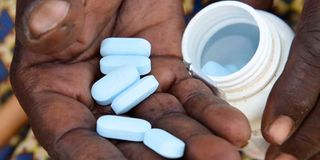Premium
State, USAid wrangle over Sh90m ARVs import tax

A patient displays one type of the ARVs in use in Kenya.
The lives of 1.5 million HIV patients are in jeopardy as life-saving drugs worth Sh2.1 billion remain stuck at the port of Mombasa over a tax dispute between Kenya and the donor, US Agency for International Development (USAid).
The antiretroviral drugs arrived in the country on January 18 but have not been cleared for entry as the Kenya Revenue Authority and USAid have failed to agree on who should pay the taxes – or whether there should be any tax claim in the first place.
The government handed a Sh90 million tax bill to the American firm Chemonics, which had imported the drugs on behalf of USAid. This, the government said, was because USAid side-stepped protocols on HIV and tuberculosis drug donations.
Instead of using government channels, USAid used a private firm and Kenya argues that the arrangement flouted tax waiver policies on government-to-government donations.
A letter to the Ministry of Health by the donors indicates that they had found it hard to obtain import permits from the Pharmacy and Poisons Board (PPB) and so they cannot proceed with importation and customs clearance.
Retention certificate
“USAid has encountered several challenges to obtain the necessary documents from PPB to proceed with the clearance of the commodities, specifically drugs and those for monitoring viral loads in patients,” notes the letter.
According to the documents, stuck at the port are 258,954 packs of Tenofovir, Lamivudine Dolutegravir (TLD).
An application for import permits and approval of the import declaration form were submitted on December 16, 2020 and resubmitted in January 5, 2021 to the appointed agent.
This was rejected by the PPB, which cited the requirement for the applications to be submitted by the listed consignee. The application was resubmitted on January 22, 2021 by the US and approval is still pending, with the PPB citing failure to attach the retention certificate.
“USAid kindly requests that the Ministry of Health to work with PPB to accelerate the process of issuing the retention certificate, following a review to ensure that the application is fully in order,” says the letter to the MoH dated January 29 and signed by USAid mission director Mark Meassick.
Another consignment of viral load reagents for 338,859 tests in South Africa is awaiting pre-shipment inspection as required by the Kenya Bureau of Standards (Kebs)
The letter to the MoH states that on January 5, 2021, an initial request was submitted to PPB since it is a requirement that for the pre-shipment inspection to proceed, the final approved IDF and import permit form from PPB must be made available. The PPB rejected the application citing the requirement for the application to be submitted by the listed consignee. On January 19, the donor resubmitted the application through the US Embassy, but it is yet to be approved.
The same applies to 5,166 Early Infant Diagnosis units in Germany and 1,750 Dry Blood Spot collection kits, all awaiting pre-shipment inspection by Kebs.
All the applications have been rejected by the PPB and subsequent reapplications are awaiting approval.
PPB says initially, the USAid donations would go to Kenya Medical Supplies Authority and the donor was expected to list government agencies (Kemsa) and ministries (Ministry of Health) as consignees in order to qualify for duty and tax waivers. This means that the consignment would have been consigned to the Kenyan government.
HIV commodities are normally received from Kemsa. Imports through private firms do not qualify for special exemptions and are subject to the normal clearance procedure, which involves inspection at the port by Kebs and imposition of taxes, including the railway development levy.
The Health ministry has since advised the donor to change the listed consignee from the private company to Kenyan government.
In a meeting held by the Ministry of Health last week, USAid agreed to change the consignee to government in order for the government to waive the tax.
HIV care
“So far as the Board, they have met all the conditions and it is now upon them to agree with the ministry once everything is settled, then they should be cleared," says the PPB.
The Saturday Nation has learnt that since January, the supply of ARVs has been inconsistent while stocks of Dolutegravir (the current first-line ARV) are low.
Facilities are now offering second-line ARVs – TDF/3TC and ATV/r – as alternatives to TLD.
Dr Richard Ayah, a lecturer in Health Policy and Health Systems at the University of Nairobi, says Kenya needs to critically look at how it finances HIV care or gains will be lost.
The latest Kenya HIV Progress Indicators report states that Kenya is recording 114 infections every day, with the number of new infections reduced from approximately 2.8 per 1,000 people in 2010 to 1.3 per 1,000 in 2020.
The national prevalence of HIV stands at 4.5 per cent, with about 1.5 million people living with the virus.
Yesterday, the Pharmaceutical Society of Kenya warned of an ARV supply crisis and urged President Uhuru Kenyatta to direct the ministries of Health, Foreign Affairs and Treasury to urgently end the diplomatic row.
Last week, Médecins Sans Frontières warned that the lives of more than 114,000 people living with HIV in Homa Bay County are at risk because of shortages in ARV supplies.




